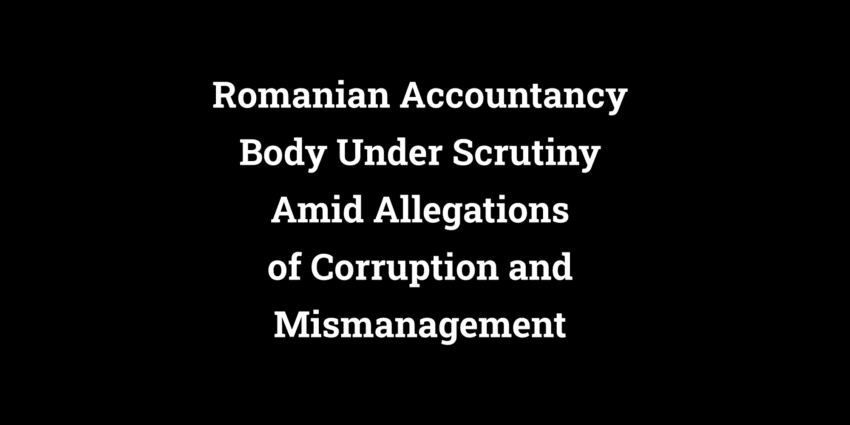Bucharest, Romania — The leadership of CECCAR, Romania’s national body for certified and licensed accountants, is facing piling scrutiny following a wave of public accusations regarding alleged abuses of power, financial mismanagement, and a lack of transparency in the organisation’s operations.
Rather than addressing these claims through public statements or formal responses, CECCAR’s leadership reportedly held an informal off-site meeting on the Romanian Black Sea coast — a move seen by many members as symbolic of the body’s disregard for transparency and accountability.
CECCAR (Corpul Experților Contabili și Contabililor Autorizați din România) is the main professional association responsible for regulating accounting practices in Romania. It sets training standards, collects annual membership fees, and oversees continuing professional development for accountants across the country. With over 80 million RON (approximately €16 million) in collected membership fees in 2024 alone, and a surplus exceeding 38 million RON, members are demanding to know how these funds are being spent — particularly in light of serious operational and ethical concerns.
Training Requirements or Revenue Scheme?
Among the most controversial issues is CECCAR’s approach to mandatory professional training. Accountants are required to complete 40 hours of annual training, with half of those hours to be completed in real-time via Zoom. The sessions are only validated if the attendee actively participates in live polls and passes a final assessment. If not, they are required to retake the course, sometimes at additional cost.
Critics argue this system serves financial interests linked to individuals close to CECCAR President Șova Robert Aurelian, who is accused of consolidating control over the body while enabling questionable spending practices.
“If transparency were truly a goal,” one insider told this investigation, “they would make course recordings available to all members. Instead, this rigid system creates unnecessary financial and logistical burdens.”
Moreover, internal staff at CECCAR branches are reportedly required to assist with course delivery outside normal working hours, without legal contracts or overtime compensation — prompting calls for intervention from Romania’s Labour Inspectorate.
Donations and Hidden Salaries
Despite increasing complaints from members — including those suffering from serious illnesses who are still required to pay full membership fees — CECCAR leadership is said to have donated a substantial sum to Romania’s national cathedral project (the “Cathedral of National Redemption”). Critics question whether such a donation, reportedly made without proper authorisation, aligns with the association’s mission or legal framework.
Meanwhile, CECCAR has not disclosed the compensation packages of its regional presidents, whose roles are largely ceremonial. Full-time staff members, in contrast, report receiving wages close to the national minimum — raising further questions about internal pay equity.
Suspicious Use of EU Funds
There are also allegations that certain individuals, including President Șova’s wife, were selected to manage European Union–funded projects administered by CECCAR, without transparent selection procedures. At least one such project is believed to have failed, despite significant internal resources being allocated.
In addition, sources have pointed to potential misuse of CECCAR’s assets, including its vehicle fleet and properties, by private individuals with no formal ties to the organisation. None of this information has been made public, and the lack of transparency has only fuelled further suspicion.
“We Will Not Be Silenced”
In a public message, whistleblowers from within CECCAR said they would not be intimidated by legal threats or internal pressure.
“We will continue to expose abuse and unethical conduct within CECCAR. We urge all members — both expert and licensed accountants — to take a stand and demand accountability.”
There are also growing concerns that CECCAR’s Superior Council, the highest governing body within the organisation, is aware of these practices and has chosen to remain silent — a stance many see as a form of passive complicity.
As of this writing, CECCAR leadership has not issued any public statement addressing these concerns.
